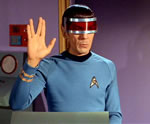My book-reading fiscal year (BRFY) ends April 30. Here is my report, submitted for your approval.
This year I read 32 books, which in terms of sheer numbers is the worst book reading year I’ve had in BRFY history. In terms of pages it’s probably not quite as sorry since I read several very long tomes. But either way, it’s been a fairly weak year of reading, I’m sad to say. I didn’t read as much as usual and I didn’t love a lot of what I read.
I can cite a few logistical reasons. It was just a darn busy year. I changed jobs twice, which means I spent many evenings pouring over job listings and tweaking resumes and cover letters rather than sitting in my basement reading sci-fi books. (It all turned out fine, by the way. If I blogged more about real life sometimes instead of Star Trek this would probably be more clear. But I took a detour out of the library world last summer, which turned out to not really be what I’d hoped, then I had a good opportunity to go back into libraries, so I did. Quite happy with the new situation, thank you.) I also took a statistics class last summer which, while highly educational and interesting, was thoroughly brutal. It was everything I could do just to keep up with it. So, my reading time was hampered for a large portion of this year. I don’t know how this happens. I hate being busy. When will I be done being a grown-up? Most of this stuff is laaame.
What I did read was quite often very long. After looming on my bookshelf for years, I finally got around to Neal Stephenson’s gargantuan Baroque Cycle. I liked it fine. Naturally you’d want to like something 2700 pages long more, but there it is. I started Robert Caro’s The Power Broker some time ago, and read it for like forever and haven’t even finished it for this year. I tackled a bunch of thick nonfiction. Even the graphic novels I read this year took weeks.
Best of the year goes to an author, rather than an individual book. This was the year I finally read some Kurt Vonnegut, and man, I loved it. Cat’s Cradle was probably the best, but I also devoured Sirens of Titan, Slaughterhouse Five, Breakfast of Champions, and Mother Night and dug them all. One caveat: K says that she read a bunch of Vonnegut years ago and liked it all a lot, but the problem is that in retrospect, she can’t really remember what happens in each particular book. They’re all just Vonnegut stuff. I’ve read them all in just one year, and I kind of agree. But still! You can’t beat the return on investment. Recall my post on The Barbecue Zone. Similar principle. Very outstanding read, and incredibly fast and absorbing. I like Thomas Pynchon and David Foster Wallace, but those dudes are out to destroy me. Vonnegut packs wonderful ideas into simple language like no one else. Planning on filling out my reading of him this year.
Other highlights:
- Read Robert Charles Wilson’s Spin trilogy. The first one is truly great sci-fi. The second and third really can’t live up to their predecessor but I was happy to have completed the set. I should also say that Spin is a great sci-fi book for non-sci-fi readers who are curious about the genre. It doesn’t have the typical sci-fi problem of being weak on characterization and it’s a terrific story.
- So remember how for years I was trying to read Hugo award winners? I read, uh, zero this year. (Well, I re-read a couple, but nothing new was crossed off the list.) I meant to knock out the two David Brin winners from the Uplift Saga, but I burned out on the second one, so that didn’t happen. This is actually a topic for a longer post. I came to some decisions about this ongoing project.
- Best nonfiction book I read was The Omnivore’s Dilemma. Makes you pretty much hate yourself for going to the grocery store, but there’s a lot that everyone needs to know in there.
Some goals for the upcoming year: Resume some Hugo reading. I’d like to get through more books in general for the variety, but frankly, I’m reading a huge one now and want to read several others soon. So we’ll see about that. Will this be the year of Gravity’s Rainbow? Maybe. Read a few of the things that have been unread on my bookshelf forever. Re-visit some Brian Aldiss. I used to love that guy but haven’t read anything of his for years. I’d also like to tackle some of those notable titles that I always hear about that pop up on lists like this. The ones I have read on there are terrific.
The complete list, favorites in bold, listed with date of completion:
- Cat’s Cradle, Kurt Vonnegut, 5/3/11
- Asterios Polyp, David Mazzucchelli, 5/5/11
- The Far Arena, Richard Ben Sapir, 5/23/11
- Baseball Hacks, Joseph Adler, 5/24/11
- The Omnivore’s Dilemma, Michael Pollan, 6/21/11
- Quicksilver (Baroque Cycle #1), Neal Stephenson, 7/5/11
- Round Ireland with a Fridge, Tony Hawks, 7/14/11
- Fuzzy Nation, John Scalzi, 7/18/11
- An Off Year, Claire Zulkey, 7/18/11
- The Final Reflection, John M. Ford, 7/21/11
- Red Dwarf: Infinity Welcomes Careful Drivers, Grant Naylor, 7/22/11
- Web Analytics 2.0, Avinash Kaushik, 8/11/11
- The Power of Positive Dog Training, Pat Miller, 9/8/11
- The Other End of the Leash, Patricia B. McConnell, 9/13/11
- Don’t Shoot the Dog!, Karen Pryor, 9/26/11
- Studs Terkels’ Working: A Graphic Adaptation, Harvey Pekar, 9/28/11
- Stranger Things Happen, Kelly Link, 10/8/11
- Neutron Star, Larry Niven, 10/16/11
- Ringworld, Larry Niven, 11/2/11
- The Crying of Lot 49, Thomas Pynchon, 11/11/11
- The Confusion (Baroque Cycle #2), Neal Stephenson, 12/4/11
- Mother Night, Kurt Vonnegut, 12/8/11
- Sundiver, David Brin, 12/19/11
- Never Let Me Go, Kazuo Ishiguri, 12/30/11
- Breakfast of Champions, Kurt Vonnegut, 1/2/12
- You Couldn’t Ignore Me If You Tried, Susannah Gora, 1/30/12
- The System of the World (Baroque Cycle #3), Neal Stephenson, 2/23/12
- Spin, Robert Charles Wilson, 3/2/12
- Axis, Robert Charles Wilson, 3/12/12
- Vortex, Robert Charles Wilson, 3/25/12
- Slaughterhouse-Five, Kurt Vonnegut, 4/2/12
- Sirens of Titan, Kurt Vonnegut, 4/17/12
List is stashed here and on GoodReads (which has ratings and very occasional reviews)



